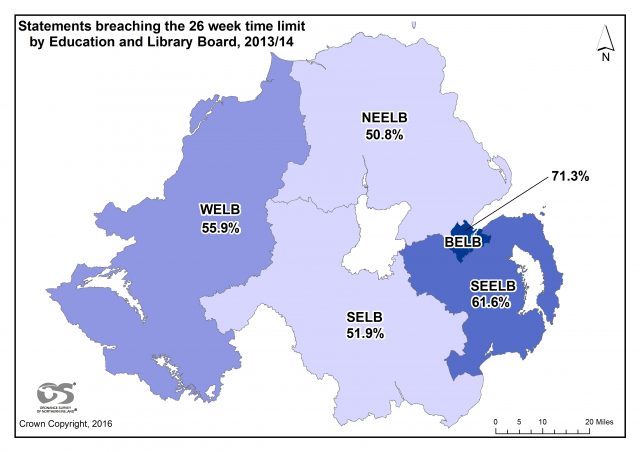The growth of special educational needs and the implementation of new legislation point to challenges ahead.
There has been a steady increase in the prevalence of special educational needs (SEN) in Northern Ireland over the past ten years, rising from 16% of all school pupils in 2005/06 to 22% of pupils (73,435) in 2014/15.
Implementation of the Special Educational Needs and Disability (SEND) Act, together with forthcoming subordinate legislation and a revised statutory Code of Practice, present a number of challenges for the new Assembly. Under the revised approach, the number of SEN assessment stages will reduce from five to three, and it is likely that fewer children will undergo statutory assessment and receive a statement of SEN, with greater emphasis placed instead on in-school support.
Existing delays in statutory SEN identification and assessment call into question a planned reduction in timeframes…
The Education Authority has 26 weeks in which to issue a final statement of SEN, which will reduce to 20 weeks under the new framework. However, a majority (59%) of statements breached the current time limit in 2013/14. Of these, three-quarters (75%) were issued in 6-9 months, while a further 22% were issued in 9-12 months.

A broad range of ‘valid exceptions’ are permitted, including late receipt of advice from a Health and Social Care Trust; this accounted for almost three-quarters (74%) of delays in 2013/14. Nonetheless, 9% of delayed statements were not subject to a valid exception.
The SEND Act will require education and health authorities to cooperate, although challenges are likely to remain…
Evidence points to inadequate joint working between education and health bodies in relation to SEN assessment and provision in Northern Ireland, with mounting pressures on health budgets presenting a further challenge. While recent legislation requires education and health bodies to cooperate in relation to SEN, with duties for joint planning and provision for oversight roles, these long-standing issues may be challenging to resolve.
A number of rights will transfer from parents to children, but draft regulations do not require support or advocacy for young people…
The SEND Act transfers a number of rights from parents to children over compulsory school age, including the right to request an assessment and to appeal to the Special Educational Needs and Disability Tribunal (SENDIST).
Evidence suggests that support, advocacy and access to legal advice and representation play an important role in promoting capacity to exercise legal rights. This is particularly important for young people in light of their age, vulnerability and lack of income. However, the draft SEN regulations do not require the Education Authority to arrange or fund support or advocacy for young people.
The draft regulations also detail the procedure for determining whether a child has the capacity to exercise their rights within the framework. While the recent Mental Capacity Act requires that all practicable help and support are provided prior to determining incapacity under its provisions, the draft SEN Regulations do not provide for any such support or advocacy.
Existing concerns around the appeals process raise questions about the participation of young people…
Research highlights a perception of inequality between parties at SENDIST hearings. Parents are not entitled to free representation, and may not understand the legislation or their rights, while the Education Authority is well-versed in the tribunal processes and has access to legal expertise and professional witnesses. This raises questions about the participation of young people with SEN, including issues around access to justice, meaningful participation and the provision of support, advocacy and legal advice.
As such, there are a number of challenges ahead…
It is clear that the new Assembly will face a number of challenges in relation to the SEN framework, particularly around: the greater emphasis on in-school support; waiting times for statements; joint working across education and health; provisions for determining mental capacity; and access to justice. A forthcoming regional plan for special schools will also influence the shape and structure of SEN provision in the years to come.

